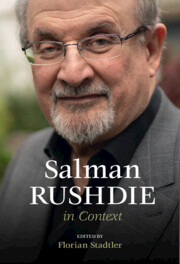Book contents
- Salman Rushdie in Context
- Salman Rushdie in Context
- Copyright page
- Dedication
- Contents
- Contributors
- Acknowledgements
- Introduction
- Part I Life
- Part II Literary and Creative Contexts
- Part III Historical and Cultural Contexts
- Chapter 10 Salman Rushdie and History
- Chapter 11 Religious and Ideological Mythologies in Salman Rushdie’s Novels
- Chapter 12 Revisiting the City in Rushdie’s Fiction
- Chapter 13 Nationalism and Transnationalism in Salman Rushdie’s Novels
- Chapter 14 Rushdie and Globalization
- Chapter 15 Salman Rushdie and Diasporic Identities
- Chapter 16 Rushdie and Secularism
- Chapter 17 Orientalism, Terrorism, and Counterinsurgency in Salman Rushdie’s Novels
- Chapter 18 Salman Rushdie’s Upwardly Mobile, Globally Migrating Middle Classes
- Chapter 19 Scheherazade and Her Cousins
- Chapter 20 Filmi Contexts
- Chapter 21 Salman Rushdie and World-Historical Capitalism
- Chapter 22 The Anthropocene and Ecological Limits in the Works of Salman Rushdie
- Part IV Critical Theoretical Contexts
- Part V Reception, Criticism, and Adaptation
- Works by Salman Rushdie
- Select Bibliography
- Index
Chapter 16 - Rushdie and Secularism
from Part III - Historical and Cultural Contexts
Published online by Cambridge University Press: 23 March 2023
- Salman Rushdie in Context
- Salman Rushdie in Context
- Copyright page
- Dedication
- Contents
- Contributors
- Acknowledgements
- Introduction
- Part I Life
- Part II Literary and Creative Contexts
- Part III Historical and Cultural Contexts
- Chapter 10 Salman Rushdie and History
- Chapter 11 Religious and Ideological Mythologies in Salman Rushdie’s Novels
- Chapter 12 Revisiting the City in Rushdie’s Fiction
- Chapter 13 Nationalism and Transnationalism in Salman Rushdie’s Novels
- Chapter 14 Rushdie and Globalization
- Chapter 15 Salman Rushdie and Diasporic Identities
- Chapter 16 Rushdie and Secularism
- Chapter 17 Orientalism, Terrorism, and Counterinsurgency in Salman Rushdie’s Novels
- Chapter 18 Salman Rushdie’s Upwardly Mobile, Globally Migrating Middle Classes
- Chapter 19 Scheherazade and Her Cousins
- Chapter 20 Filmi Contexts
- Chapter 21 Salman Rushdie and World-Historical Capitalism
- Chapter 22 The Anthropocene and Ecological Limits in the Works of Salman Rushdie
- Part IV Critical Theoretical Contexts
- Part V Reception, Criticism, and Adaptation
- Works by Salman Rushdie
- Select Bibliography
- Index
Summary
This chapter considers the wider contexts of secularism in relation to Salman Rushdie’s novels. It delineates different conceptions of secularism with which Rushdie is preoccupied. Midnight’s Children, The Moor’s Last Sigh, and Shalimar the Clown are especially concerned with the notion of the syncretic and secular ideal of the Indian nation, championed by Nehru and the Indian National Congress at independence. It is the concerted dismantling of this postcolonial settlement and the Nehruvian vision of the nation at independence, and the replacement of this founding myth with an exclusionist nationalist narrative, that Rushdie critiques in these novels. This chapter also delineates the wider contexts with which Rushdie engages to chart the decline of Indian secularism and the syncretic concept of the Indian nation. It furthermore considers debates of secularism in relation to western definitions and how these feature in novels such as Two Years Eight Months and Twenty-Eight Nights. These intersections open up complex ideological debates around rationality, faith, and religion, central to much of Rushdie’s works.
- Type
- Chapter
- Information
- Salman Rushdie in Context , pp. 205 - 216Publisher: Cambridge University PressPrint publication year: 2023

